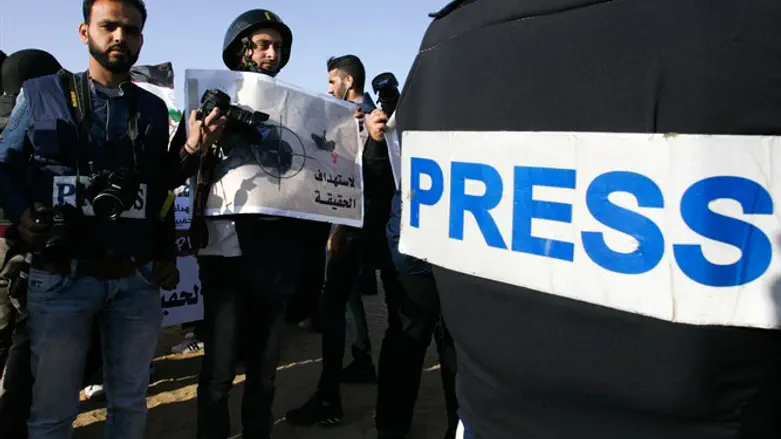
Zionist organizations and the Israeli government devote incalculable resources to contain the damage caused by news reports and opinion pieces that portray Israel unfairly. The conventional response is for Israeli diplomats and hasbara activists to bombard journalists with angry reader comments.
This approach is failing. Despite the valiant and intelligent efforts of the pro-Israel community, biased and misleading reporting about the Israeli-Arab conflict is as prevalent in 2020 as ever. This frustrating balance sheet has strengthened Israelis’ conviction that the world hates Israel and that the root of journalistic hostility towards Israel is the atavistic antisemitism of Western journalists.
This deduction is certainly correct in some cases. However it ignores the fact that Jewish journalists reporting from Israel are often just as critical of Israel as their gentile colleagues. Instead of pursuing a witch-hunt of alleged anti-Semites and self-hating Jews, it is sensible to understand the sociological and psychological dynamics that drive international journalists to believe and promote Arab and leftist narratives about Israel.
The first reason is the very human trait to seek the company and friendship of like-minded people. In the case of the foreign reporters with a progressive bent, this means hobnobbing with Israeli intellectuals, academics and NGO workers while in Israel. These milieus are notorious for being ignorant about religious Judaism, for not appreciating the Jewish connection to Judea and Samaria, and for claiming that rightwing Israelis and particularly Jews in the 'West Bank' are primitive and fanatic.
Once the “enlightened Israeli opinion” about the conflict is heard, foreign reporters tour the Palestinian Authority. In Bethlehem and Ramallah, Arab courtesy and hospitality together with moving litanies about endless Israeli abuses erase all hopes these journalists will appreciate the reasons most Jewish Israelis support hawkish parties.

Most foreign journalists assume they are being fair and even-handed because they hear and understand the views of elitist Jews and polished Palestinian Arabs. The end result is that most foreign journalists assume they are being fair and even-handed because they hear and understand the views of elitist Jews and polished Palestinian Arabs.
The end result is that most foreign journalists assume they are being fair and even-handed because they hear and understand the views of elitist Jews and polished Palestinian Arabs.
Due to these sociological dynamics and due to language barriers, most journalists will never meet Jews in Judea and Samaria, even those who work for reconciliation between Jews and Muslims. Neither will they meet Palestinian Arab gays who fear death if they stay in the Palestinian Authority territories. Even less will they hear mosque preachers who incite Palestinian youths to murder and maim Jewish civilians.
This journalistic ignorance urgently needs to be challenged. A promising strategy to educate journalists in Israel and abroad who report about the Israeli-Arab conflict is the establishment of an online platform where journalists are provided with quality literature about Judaism, Jewish history, Zionism, Arab history, Palestinian Arab nationalism and Islamic jihadism.
Access to these resources would allow journalists to learn facts and opinions they will never learn at receptions in foreign diplomatic missions or while relaxing in the lounges of the fancy hotels popular among expatriates in Jerusalem.
In order to encourage journalists to take advantage of these resources, journalists who prove their historical, cultural and religious literacy should be compensated. Given that reading and learning does demand a substantial investment of time and intellectual energy, rewarding the effort of these journalists would be no different than compensating college students who choose to study Judaism. Journalists could prove the knowledge they acquire, for example, by passing online tests.
Given the diminishing salaries and budgets of journalists, offering them a monetary incentive to educate themselves about the conflict from a variety of viewpoints would be a relatively inexpensive, yet extremely effective way of advancing Israeli interests. To bring the voice of settlers, Jewish refugees from Muslim countries and victims of Islamic violence to the attention of foreign journalists would help the world understand Israel better.
This initiative would not limit the freedom of foreign journalists. Nor will it affect those who are antisemitic to begin with. However, it could ensure that foreign journalists use their spare time to genuinely understand the conflict instead of passing hasty verdicts while sipping champagne at cocktail parties.
Rafael Castro is a Yale and Hebrew University educated business and political analyst based in Europe. who specializes in proofreading, editing and ghostwriting quality texts for entrepreneurs and politicians. He can be reached at rafaelcastro78@gmail.com